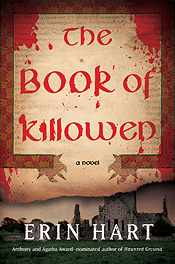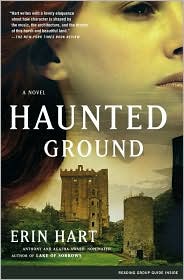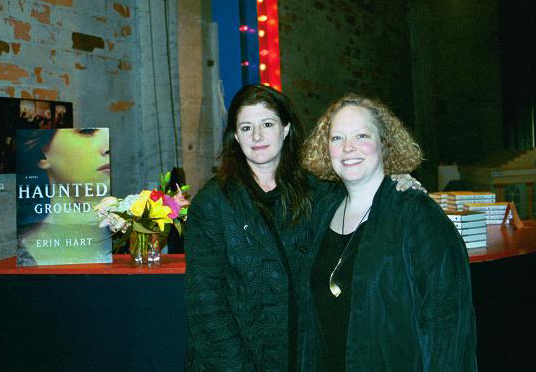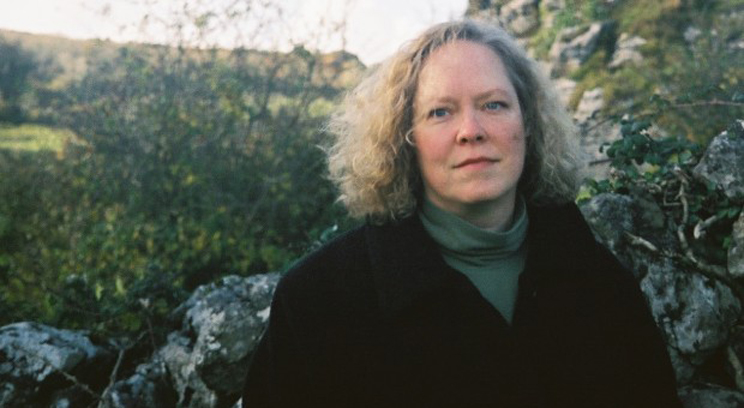Local mystery author Erin Hart will be at St. Thomas from noon to 1 p.m. Wednesday, June 26, for a discussion of her fourth and latest novel, The Book of Killowen. The book is the June selection of the Luann Dummer Center for Women's monthly book club. The meeting will be held in the center's lounge, Room 103, O'Shaughnessy Educational Center, and is free and open to the public.
Killowen continues the story of Hart's crime-solving pair, American pathologist Nora Gavin and Irish archaeologist Cormac Maguire. Set again in Ireland, Hart's novel has Gavin and Maguire investigating the puzzling connection between two men, born centuries apart, whose murdered bodies are discovered together in the trunk of a sunken car in a bog.
 Hart earned an M.A. in creative writing from the University of Minnesota, a degree she earned attending one evening class every other quarter for eight years. She worked as a freelance arts journalist and theater critic – contributing to the Star Tribune, Minnesota Monthly and Minnesota Public Radio, among others – when she enrolled in graduate school strictly "to keep my brain from shrinking," she said. Never intending to pursue a career as a novelist, she studied and wrote mainly essays, articles and memoirs.
Hart earned an M.A. in creative writing from the University of Minnesota, a degree she earned attending one evening class every other quarter for eight years. She worked as a freelance arts journalist and theater critic – contributing to the Star Tribune, Minnesota Monthly and Minnesota Public Radio, among others – when she enrolled in graduate school strictly "to keep my brain from shrinking," she said. Never intending to pursue a career as a novelist, she studied and wrote mainly essays, articles and memoirs.
Literary agents began knocking on her door soon after she won Glimmer Train journal's Short Story Award for New Writers in 1996 (for the first and only short story she has ever written, "Waterborne"). But she had already decided she would pursue a novel idea that had been percolating since graduate school.
"The day Glimmer Train called me I was in bed with pneumonia, reading mysteries. And when I hung up the phone, I said, 'I need to write this novel.' And I did," Hart remembered. The book became Haunted Ground, published in 2003, based on the real news story she read of a girl's severed head found perfectly preserved in an Irish bog. It remains her bestselling novel to date.
Her other novels include Lake of Sorrows (which was copy-edited by New York Times bestselling author Tana French, still a freelancer in the publishing world at the time) and False Mermaid.
Hart spent some time away from promoting Killowen to answer questions via email and phone with the Newsroom.
Your career in crime fiction began relatively late in life, in your early 40s. Was it difficult to write your first novel, Haunted Ground, while working full-time?
I’m not sure I’d describe the process as difficult, but it did take quite a long time! I started thinking about Haunted Ground in 1986, and didn’t begin writing it until 1996. I did spend eight years of those intervening years getting a master’s degree in creative writing, going to school in the evening and working during the day. From the time I started writing, it took about four years until the manuscript was ready to send out to publishers, and another two years before the book was finally launched. The great thing was that I wasn’t under any deadline, so I could really take the time to write the book I wanted to write; the difficulty was squeezing in writing time on evenings and weekends. My husband cooked a lot of dinners while I was out wandering imaginary bogs! Two things kept me going: I didn’t know how the story ended (and wanted to find out), and I figured that the market was good. In other words, if I could manage to write a really absorbing, entertaining, suspenseful mystery, someone would buy it.
Had I known the depth of my own ignorance I may never have started! I was teaching myself how to write a mystery while I was writing Haunted Ground. I’m a big fan of P.D. James. To me, she's the master mistress of the genre. I used her work as my textbook for how to write compassionate characters, interesting settings and good psychological motivation. I used A Taste for Death in particular and studied her structure, how she painted characters, etc.
Describe the moment you realized you could make a career of writing fiction for a living. Was it a leap of faith?
In early 1999, I was more than halfway through the manuscript. I had an agent waiting for it, and I guess I experienced a moment of clarity. I remember thinking, “I don’t want to be 85 years old and kicking myself for never finishing this novel.” So I asked for a six-month leave of absence from my job, and at the end of the six months, we were surviving on my freelance income at the time, along with my husband’s income as a professional touring musician. And we still had cable. My husband was a big inspiration, actually. He’d made a living for 20 years playing Irish traditional music on the accordion, and with his support I made the great leap to living as a creative artist before my book was even sold. I won’t lie – it is a challenge to make a living as self-employed artists, but we’ve managed to keep body and soul together thus far, and hope to continue.
How much archaeology, forensics and Irish history research did you do before you began writing Haunted Ground? And do you find you still have to do a lot of research for each successive novel?
 Each novel is connected to a different period in history, and the field of archaeology keeps changing with new technology, so I do have to delve pretty deep into research for each new book. I read plenty of history, and I approach archaeology and forensics by reading books and journals, but also by using my journalistic skills (I was a freelance theater critic and feature writer for years), interviewing people who actually work in those specialized fields: archaeologists and antiquities experts, pathologists, police officers, DNA experts and other forensic scientists, whatever the story demands. Some of the same people have helped me for each story in the series. I’ve been so fortunate to have good contacts, and people have been very generous with their time and knowledge. It helps that Ireland is a small island, and everyone I know there is apparently connected to someone I’d like to interview.
Each novel is connected to a different period in history, and the field of archaeology keeps changing with new technology, so I do have to delve pretty deep into research for each new book. I read plenty of history, and I approach archaeology and forensics by reading books and journals, but also by using my journalistic skills (I was a freelance theater critic and feature writer for years), interviewing people who actually work in those specialized fields: archaeologists and antiquities experts, pathologists, police officers, DNA experts and other forensic scientists, whatever the story demands. Some of the same people have helped me for each story in the series. I’ve been so fortunate to have good contacts, and people have been very generous with their time and knowledge. It helps that Ireland is a small island, and everyone I know there is apparently connected to someone I’d like to interview.
Do you feel like an expert on those subjects now?
I don’t feel that I’m a real expert on any of the subjects I write about. But I don’t think that’s really necessary, given the level of detail required in a gripping crime novel. I do take care to read a lot about a subject before interviewing a real expert. One of my biggest fears is that one of the scientists I’ve interviewed will read one of my novels and fling it across the room, so I do try to get the scientific detail down cold. But I have learned so much. It turns out that’s my real reason for writing novels – it’s an excuse to keep learning. I get to dig into so many interesting subjects.
How do you begin a novel (i.e., do you outline; do you just plow right into the writing, chapter by chapter; do you jump between chapters, etc.)?
I tend to write a novel straight through, start to finish, rather than jumping around too much. It helps me to follow a thread, and as I mentioned earlier, I don’t know how the story ends. And I do get stuck. Sometimes it takes a few days (or even weeks) of pacing and plotting before the story takes the correct turn. But writing a novel to me is almost like doing an archaeological excavation. With each chapter I’m digging further down into my characters and into the complex situations in which they find themselves. I don’t know what’s at the bottom of the pit until I get there! Once I’ve worked out how the story ends (usually pretty far into the writing process), I do go back through and make sure that all of the hints and clues and suspenseful bits dovetail neatly.
Has the dwindling influence and sales reach of book publishing changed book promotion since Haunted Ground was published in 2003?

Hart traverses a stile at Dysert O'Dea chapel in County Clare, Ireland, 2012. (Photo by Carey Sidla)
Yes and no. There are a few really bestselling authors who always tour, and the people who get the most support for touring are the people who need it least. All the midlisters like me, we don’t get that. Publishers can’t justify sinking a lot of money into touring because there’s no visible return. I've done some national tours in the past at my own expense. Recently I've toured some libraries around Minnesota, but I'm waiting to see if I can get some support from my publisher (Scribner) to do more. The whole book universe is shifting, and no one really knows where the ground is any more. The transition between real books and ebooks is a revolution. Everybody's waiting to see how the dust settles.
Publishers will do the traditional publicity they've always done – sending out copies for review, but even that's tough. The New York Times is now the only paper to print a separate section for book reviews. High-exposure, respected outlets have really dwindled. Publishing houses are just starting to get into online marketing, and a lot of the promotion now is up to the writers. I'm in charge of keeping up my own website, and social media is expected of authors now. I enjoy Facebook and I have a Pinterest account, but I'm still getting the hang of Twitter. I thought at first I'd have nothing to say, but I enjoy posting about writing, Sisters in Crime, publishing, archaeology, cool places in Ireland ... .
After J.K. Rowling “killed” Dumbledore, she said she needed a private moment to cry and mourn his death. Now that you have written four books with the crime-solving duo Nora Gavin and Cormac Maguire, have you become similarly attached to and familiar with them?
Cormac and Nora have become like old friends – although I haven’t finished with them yet, not by a long shot. I know that there are things about each of them I’ve yet to discover. And I’m probably just as attached to some of the supporting players as well. I remember my agent suggesting that I get rid of Garrett Devaney, the Garda detective in Haunted Ground, and I thought, “I can’t get rid of him – I have to know how he’s going to get on with the wife, and teaching his daughter to play the fiddle.” So Devaney actually returns in False Mermaid, the third book in the series. And fortunately, things keep turning up in Irish bogs, so I’ll never run out of material. One of the advantages to having an archaeologist as a main character is that I can dip into any period in history.
If your books were made into films, which actors would you choose to play Nora and Cormac?
Hard question! I have my own mental pictures of Cormac and Nora, and they’re not quite like any of the actors who might be chosen to play their parts. So I usually leave it up to readers. But if forced to choose… It’s been so long since I started writing the series that some of the actors I first imagined – Gabriel Byrne, Aidan Quinn – are now a little old for Cormac. So maybe Colin Farrell or Michael Fassbender, or even Jeremy Northam? And I’ve always seen someone with particularly Irish features for Nora – like Maura Tierney, or perhaps Anna Friel. Whoever the actors are, they’ve got to have a bit of chemistry!
How did your life change once you devoted your career fully to writing novels?

Hart (right) with her agent, Sally Wofford-Girand, at the book launch for Haunted Ground, November 2003. (Photo by Susan Van Baerle)
I’d say there’s a much greater flexibility in my life that I really enjoy. And a greater solitude as well, working alone so much of the time. But I really enjoy that. And the writing part of being a writer is not actually full time. About half the time, I’m doing a lot of what I used to do at my old communications job, i.e., publicity, marketing and promotion, things that are required of all writers nowadays. One of the lovely perks has been taking a tour group to Ireland – I’ve led a tour for the past three years, visiting many of the locations in my books – museums, castles, bogs, pubs. We’re taking a break this year, but I hope to do another tour in 2014.
Are you a night owl or morning person as far as writing style?
Definitely a morning person. I can’t work much at night, or even in the late afternoon! I like to work in the quiet mornings, with pen and paper, staring out the window and pretending that I’m in Ireland.
How often do you write? (Are you structured and write at a certain time for a certain length of time a certain number of days a week, or not?) And why does this work for you?
I’m afraid I’m completely undisciplined. I’d love to have a set ritual, but I don’t. But when I’m working on a book, I try to write at least three pages a day. For a long time it feels as if you’re not making any progress, but eventually those pages add up to a few chapters, and before you know it, half the book is written.
How do you celebrate the completion of a novel?
Paddy (my husband) and I usually treat ourselves to a lovely dinner out to celebrate any big project being finished at last. In addition to his music CDs, my husband has undertaken a huge documentary project, The Paddy O’Brien Tune Collection (so far containing 1,000 tunes from his repertoire of traditional music), and he has also written a book, a memoir called The Road From Castlebarnagh, about growing up playing traditional music in rural Ireland in the 1950s and 60s. It’s great – and yes, I am totally biased, but others agree!







